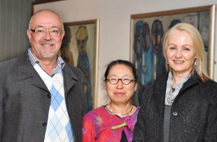 |
|
Prof. Frans Swanepoel, Senior Director Research Development; Prof. Sakiko Fukuda-Parr; and Prof. Melanie Walker.
Photo: Supplied
06 June 2012
|
Prof. Sakiko Fukuda-Parr of the New School University, New York, in the United States of America, recently presented a seminar on the Bloemfontein Campus. The seminar was hosted by Prof. Melanie Walker, Senior Professor and SARChI-nominated candidate for Higher Education and Human Development.
Prof. Fukuda-Parr, currently Head of the Graduate Programme in International Affairs at the New School University, spoke about the Right to Food in SA. She explored the relationship between two approaches – human rights and capabilities (or human development). This was done to enhance the understanding of both as theoretical paradigms, as public policy frameworks and as approaches to development.
Prof. Fukuda-Parr is a Japanese national, a graduate from Cambridge University in the UK and a former professor at Harvard University in the USA. From 1995 to 2004, she was main author and Director of the UNDP Human Development Reports.
In addition to these reports, some of her publications include: The Gene Revolution: GM Crops and Unequal Development; Readings in Human Development; Rethinking Technical Cooperation - Reforms for capacity building in Africa; Capacity for Development - Old Problems, New Solutions and numerous papers and book chapters on issues of poverty, violent conflict, gender, human rights and technology. She was appointed by the United Nations Secretary-General to the Committee on Development Policy.